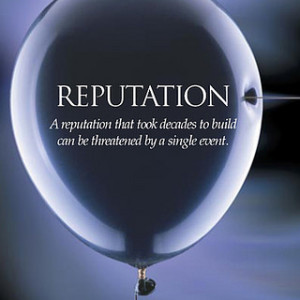

Risky Business
[by Bruce Hennes] According to Reputation Dividend, a company that helps quantify the economic value of reputation for publicly held businesses, few CEOs would argue that their corporate reputation isn’t one of their company’s most precious assets.
Giving thought to the difference between ‘brand’ and ‘reputation,’ Sandra Macleod writes, “The value and importance of a ‘brand’ i.e. the thoughts, feeling and associations that consumers attach to the things they buy, is generally well understood. But the value of ‘reputation’, the thoughts, feelings and associations attached to the organizations that produce them across a variety of stakeholders is not.”
Macleod further writes, “But now, as risk becomes more complex, transparency more radical, and reputation more dear, with trust as the prize, our mission becomes ever more relevant. Through better alignment with stakeholder values and expectations, attention to authentic reputation creates very real value. It allows people and businesses to embrace innovation and protect themselves from risk. And it helps them to become prosperous, resilient and stable, and frees up all those unaccounted-for and wasted costs otherwise spent on fighting fires, fighting for talent, fighting to hold customers, fighting to win over investors, or fighting to shore up blunders.”
Anthony Hilton, writing for the London Evening Standard, gets a little more granular: “Twitter, Facebook and the rest are breaking down silos within businesses. They are also flattening structures inside companies by making it possible for chief executives to communicate directly with their front-line troops and, more importantly, for the front-line troops to talk back. The result, if this continues to any degree, is the breakdown of traditional company hierarchies and the bypassing of whole tiers of middle management.” Hilton also suggests “this is already a weak area for risk management, which is usually numbers-driven and often out of its depth when it seeks to identify and deal with softer intangible risks.”
As we have long counseled clients of Hennes Communications, there is simply no substitute for the ruthless self-examination of potential vulnerabilities as a first step towards bullet-proofing the business entity and protecting its reputation. Such an exercise can’t erase the past, but it can help the organization identify emerging issues – the root cause of many situations that eventually become crisis events, correct deficiencies in operations or policies that represent avoidable crises and prepare for the inevitable crisis situations that will occur, no matter how well-managed and ethically run the business is. It also allows the organization to think clearly, in calm circumstances, about the way it will want to communicate about these vulnerabilities should they evolve into a sudden reputational threat.
Here’s why that process of introspection is so important: Failure to be prepared permits critics to tell their side of the story without challenge in those first few news and social media cycles, allowing them to frame the issue and participants, usually in terms that are unfavorable and hard to reverse.
Perhaps the Georgetown Journal of Legal Ethics summed it up best when by writing, ”As almost any general counsel of a large, publicly traded, consumer-oriented company will tell you, legal controversies today are tried in the Court of Public Opinion — at least as much as in any Court of Law. Every organization, especially large, publicly traded corporations has much to gain (or lose) by the way a legal controversy is positioned in the media. Because the value of a company’s reputation is immeasurable — and perhaps its largest uninsured asset — a corporation loses when the brand image is tarnished, even if the corporation technically wins at trial. Furthermore, since most legal controversies are settled prior to trial, the Court of Public Opinion has arguably become the most important battleground affecting not only good will and market share, but legal bargaining power and settlement negotiations.”
Reputation is tangible, but it is also fragile. While Sony, Honda, Walt Disney, Apple, Microsoft and Costco are sufficiently strong to withstand just about any type of threat, can you say the same about your organization?
photo credit: <a href=”https://www.flickr.com/photos/chapmanlam_cm/14311312039/”>chapmanlam_cm</a> via <a href=”http://photopin.com”>photopin</a> <a href=”http://creativecommons.org/licenses/by-sa/2.0/”>cc</a>
